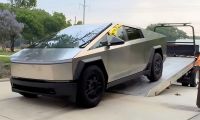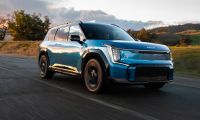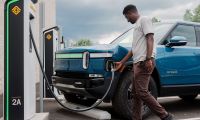Toyota is a huge automobile company and one expects this Japanese carmaker, which is generally at the forefront of technology, would be ahead when it comes to electric cars. Yet, Toyota is far beyond Tesla in this segment. Why does Toyota still not make electric vehicles? What is it that is an issue for Toyota, but not an issue for Tesla?
The closest Toyota came to electric cars, was that when it revealed the Mirai, which was revealed a year ago, the RAV4 EV in partnership with Tesla, and the Prius Prime with incredible MPG.
Torque News just learned on December 24 that Toyota plans to launch a two-seater compact EV next year in Japan with an initial sales target of around 100 vehicles for business and local government. Toyota compact EV will have some compact specs: it will run100 km (60 miles) per single charge and will cost around $16,000.
RPM's team took the question of why Toyota doesn't make electric vehicles to Toyota's team of engineers and designers and obtained some very interesting answers from them.
Toyota's Position on Electric Vehicles
From the outset, Toyota maintains that the main issue of electric vehicles is the production of batteries. What does not seem to be a big issue for a manufacturer like Tesla, which produces several hundred thousand electric vehicles annually, is for Toyota, whose battery capacity for electric vehicles is not as high.
Toyota, therefore, prefers to produce, with the same amount of materials that are used to build a single electric vehicle battery, 10, 15, 20, or even 25 hybrid or plug-in hybrid vehicle batteries. This distribution of resources allows you to obtain more vehicles for the same amount of ore.
There is a definite advantage that results from this strategy. "The manufacturer insists on the fact that the reduction in pollution provided by several hybrids or plug-in hybrid vehicles is more significant than the impact of a single electric vehicle built with the same resources. It would therefore be, according to Toyota, more environmentally responsible to produce many hybrid vehicles than few electric vehicles," reports Samuel Lessard at RPM.
That being said, it is not because no electric vehicle using a battery is currently offered on the market by Toyota that the manufacturer is ignorant on this subject. The fact that several hybrid vehicles have been sold by Toyota for more than 20 years has enabled it to collect data useful for the eventual design of an electric vehicle. In fact, Torque News Toyota reporter Peter Neilson thinks that Toyota's upcoming solid-state battery will crash Tesla's Li-Ion batteries just because of the reach data and knowledge that Toyota has acquired on this subject through its thousands of patents.
When Will We See The First Toyota Electric Vehicle?
Make no mistake: "if there is money to be made with electric vehicles, Toyota will sooner or later join in," thinks Lessard. Moreover, the manufacturer is actively working on the development of new technologies, such as the solid electrolyte battery, which should prove to be less expensive to produce and more energy-efficient than the current lithium-ion battery. In fact, Toyota has said it will launch its own on the market in 2025.
More specifically, Toyota has committed to launching six new electric vehicles by 2025. It is therefore only a matter of time before being able to drive in a Toyota brand battery electric vehicle.
Tesla, on the other hand, keeps making good advances. It confidently leads the EV market right now. Tesla's rise, the advance in EV batteries, and the drop in battery prices will help Tesla in the next couple of years and end the parity with gas cars in Tesla's favor and in the favor of electric cars.
Soon, Tesla and Toyota will follow the same line as the Japanese government just announced a plan to ban cars with internal combustion engines by 2030.
Do you think Toyota will have a more confident position in the electric vehicle market than Tesla once it starts mass-producing electric vehicles?
Armen Hareyan is the founder and the Editor in Chief of Torque News. He founded TorqueNews.com in 2010, which since then has been publishing expert news and analysis about the automotive industry. He can be reached at Torque News Twitter, Facebok, Linkedin and Youtube.
Set as google preferred source












Comments
Tesla also has a huge head
Permalink
Tesla also has a huge head start on the tech. The early adopter always has the advantage.
Correction; Massive,
Permalink
In reply to Tesla also has a huge head by Richard (not verified)
Correction; Massive, sustained multi-pronged and frankly regressive government support (i.e. taxpayers) made Tesla
If that were true The top
Permalink
In reply to Tesla also has a huge head by Richard (not verified)
If that were true The top tech companies would be Raytheon for the CK722 transistor and Fairchild for the multiple device chip. We would all be driving vehicles evolved from electric forklifts and golf carts.
Edison built an electric car in 1904 and believed that the future of automobiles would be electric.
The advantage belongs to those who develope concepts into things that meet the needs of many and efficiently can be produced to.meet those needs.
Because Toyota doesn't have
Permalink
Because Toyota doesn't have numerous gigantic battery factories like Tesla and Panasonic.
Toyota and Panasonic has been
Permalink
In reply to Because Toyota doesn't have by Keith (not verified)
Toyota and Panasonic has been partners since the 50's and have had EV battery joint ventures since 1996, and and a new one Prime Planet
Hydrogen cars will replace
Permalink
Hydrogen cars will replace battery cars eventually. I’d rather dump money/research into that than EV batteries.
Not true. Hydrogen cars have
Permalink
In reply to Hydrogen cars will replace by Sean (not verified)
Not true. Hydrogen cars have many downsides, and the theoretical limits of the technology are known. True electric vehicles will improve massively with new battery tech as it comes online.
you make money for quite
Permalink
In reply to Hydrogen cars will replace by Sean (not verified)
you make money for quite awhile. if you invested in QuantumsScale , stock symbol QS, you would have made 7 times your money in last 2 months in the battery company. VW n Microsoft are large investors. Do your homework n make money now mot 10 years from now!
The efficiency from power
Permalink
In reply to Hydrogen cars will replace by Sean (not verified)
The efficiency from power generation to torque at the wheels is 3 times greater for BEV's than for hydrogen fuel cell vehicles. That fact alone will doom hydrogen. Add the extra cost, complexity, infrastructure and maintenance needed for hydrogen and it simply can't compete.
Hydrogen electric vehicle
Permalink
In reply to Hydrogen cars will replace by Sean (not verified)
Hydrogen electric vehicle owners will end up slaves to "big hydrogen" just like we are all slaves to "Big Oil" now.(unless you already drive an ev)
Fuel cell vehicles will
Permalink
In reply to Hydrogen cars will replace by Sean (not verified)
Fuel cell vehicles will mostly be plug-in fuel cell hybrids and will be a big part of our future, especially in the transportation industry. The size of their batteries will depend on the tasks to be performed, giving drivers a choice between hydrogen and electricity. A combination of both energy sources will be used wisely. However, most smaller vehicles will be BEV's. Both vehicle types will contain solid-state batteries.
Hydrogene is 3 X less
Permalink
In reply to Hydrogen cars will replace by Sean (not verified)
Hydrogene is 3 X less efficient than Lithium battery BEV déhiciles
the only economical way to obtain H is converting natural gaz CH4 and it is a polluting fossile energy business
and worse if methane come from fracturation process .
Then a fleet of diesel polluting citern crrying H have to deliver to fill up services stations,,,
The only advantage is a HVÉ is not polluting while rolling .
The next thing comming are solid statehigh density long life Li batteries
and super capacitor can accelerate the improvement,
all the rest is just politicallobby from fossile fuel industries
I am actually glad these
Permalink
I am actually glad these manufacturing companies are having issues these electric car's batteries are way over priced don't last and the lithium dump back into the ground is horrible.
It sounds like you may be
Permalink
In reply to I am actually glad these by Blake (not verified)
It sounds like you may be surprised to learn that lithium-ion batteries store a lot more energy (i.e. they have higher energy density) than other batteries such as the lead acid batteries you use in your car to crank the engine. It further sounds like you may be surprised to learn that lithium-ion batteries can be cycled (charged/discharged) both deeper and many more times than a lead-acid battery (meaning, you shouldn't let your car battery drop below 50% charge or it will shorten the battery life). You might have noticed that you generally have to replace your car's battery every couple of years. Tesla's are still fairly young, but some of them are 6, 7, 8 years old without having had to change the battery (yet), simply because lithium-ion batteries last longer than the batteries you are accustomed to using. So, yes, lithium-ion batteries are expensive, but these are the reasons people are willing to pay for them. They are simply more useful (in certain applications) than other/cheaper types of batteries. (they are, however, becoming less expensive as new processes are invented)
Finally, lithium-ion (and all of the other chemicals and metals that go into these batteries) are very valuable. Tesla, for example, has set up recycling plants in Las Vegas and China to recycle these batteries... they aren't being dumped into the ground the way you have assumed.
It's time to catch up... there are many new and exciting things to learn about lithium-ion batteries and how they are different from the batteries you've grown up with. Even more exciting are the new solid state batteries that have recently been announced. Battery technology is on it's way up. Not down.
You are comparing a company
Permalink
You are comparing a company that can push out the same amount of cars Tesla makes in 3 months.
3 months? Try more like 12
Permalink
In reply to You are comparing a company by John (not verified)
3 months? Try more like 12-15 *days*. What tesla builds with multiple "gigafactories" is an almost insignificant number to Toyota. Plus Toyota is placing bigger bets on solving green hydrogen and making fuel cell hybrids, smth the author ignores. One-sided puff piece tbh..
But can they produce said
Permalink
In reply to You are comparing a company by John (not verified)
But can they produce said battery for said electric cars at scale? Where's their manufacturing prowess, if they are as capable as you suggest?
The problem may no be
Permalink
The problem may no be batteries, but the electricity needed to fuel them all, if everybody is to drive electric cars.
Our electric supply can't
Permalink
In reply to The problem may no be by Nuno (not verified)
Our electric supply can't keep up with the demand now. How are you going to charge millions of electric cars?
Think of how many years it takes to build a power producing plant.
It’s not only the cost or the
Permalink
In reply to Our electric supply can't by Wayne Mesdivk (not verified)
It’s not only the cost or the time to build a generation plant but the resources. It’s far for “clean”, green energy is not 100% reliable and we still be relying on Oil & gas industry in certain way. Then the electrical network... needs so much to keep up at to the estimated demand. We are not saving the planet or polluting less just on a different way
That's why PHEV's will make
Permalink
In reply to Our electric supply can't by Wayne Mesdivk (not verified)
That's why PHEV's will make the most sense for at least a decade. Although we'll be using more electricity at home and at the office to recharge them, they'll be able to completely ignore charging stations and long waits. PHEV's can not only ignore charging stations, they'll soon have decent electric-only range, great overall range, get great gas mileage, and offer more for the money. That's why I'll want a PHEV until solid-state batteries become mainstream.
Troll me all you want but I'd
Permalink
Troll me all you want but I'd never drive a Toyota, by choice. "Biggest" didn't equal good. They had the chance to go full EV decades ago but have in to their oil overlords (yeah, Google it) so not then crying sour grapes is hardly surprising.
Call him want you will, Musk has shown that oil hegemony can be broken. All it needs is a start and people to give up their outdated beliefs.
Oh btw, when the first automotive was rolled out be Ford, all horse owners were talking like the may-sayers here ... Lol
I have worked in plenty of
Permalink
In reply to Troll me all you want but I'd by Evie (not verified)
I have worked in plenty of car factories and Toyota is where I would spend my own money. Tesla have a lot to learn about quality
BEV's are a short term solution for small cars but will not be the future unless someone totally re-invents the batteries. Litium cells will be gone in 20-30 years at most. Hydrogen is the obvious fuel because of its energy density but it has many issues in practice. Some recent developments may change this though by allowing storage at much lower pressure. 5kg of hydrogen does the same work as 1000kg of lithium cells
Why would a company that is
Permalink
In reply to Troll me all you want but I'd by Evie (not verified)
Why would a company that is selling over 1.5 million hybrids and PHEV's worldwide every year and around 8 million conventional vehicles a year want to rush into the far less profitable EV market and deprive its profitable hybrids and PHEV's of batteries? The smartest thing Toyota could do while developing its solid-state battery would be to expand the Prime line to midsize sedans, trucks, and SUV's. That would also include Lexus vehicles.
As was proven by Hyundai/Kia. They came late to the auto manufacturing party, made junk, Kia almost folded, Hyundai rescued it, they started making better vehicles at bargain prices, and look at them now. Unlike them, Toyota is in the best position right now with all their cash and other ventures. They'll make plenty in the EV market when they're ready to spring into action. In the meantime, they'll keep making money and expanding into other ventures like hydrogen stations, fuel cell semis, and the like.
Toyota is still confident on
Permalink
Toyota is still confident on Global market, where IC engines are still preferred due to less EV charging infrastructure. So, for Toyota, it still too early to be 100% electrified.
Sustainable leaders must
Permalink
Sustainable leaders must require worldwide transparency of supply chains, and environmental and labor protection laws and standards to control the environmental degradation and humanity atrocities occurring around the world from the mining in foreign countries that dominate the supply chain of the exotic minerals and metals to support wind turbines, solar panels and EV battery construction. The dark side of renewable wind, solar, EV batteries, and biofuel energy is that they are not clean, green, renewable, or sustainable. They are horrifically destructive in foreign countries to vital ecological values that will last for generations to come.
We need to put the plug on
Permalink
We need to put the plug on all government support for EVs. It's asinine for taxpayers to be be providing huge subsidies for the production of a small number of cars for buyers who are obviously wealthier than the average taxpayer.
Pu the plug men's eliminating ALL avenues of government support including direct and indirect subsidies, tax breaks and mandates
Toyota wouldn't consider
Permalink
Toyota wouldn't consider Tesla's sales numbers to be at scale. And Toyota wouldn't want Tesla's "success." It wouldn't financially be worth their time for small vehicle deliveries at slim (to non-existent) profit margins. The model 3 would have been worth it for some manufacturers but they would consider all other Tesla models to have failed. Think about the cost not only to build these cars and slim margins due to expensive battery packs but also the time/cost/effort in design. Instead, they are collectively pouring hundreds of billions in R&D and will enter in 5 years when they think they it will be profitable and still well within reach of taking control of the EV market. Tesla's most brilliant move was convincing owners to pay thousands of dollars for software. That's why their stock is so high. It actually has nothing to do with EVs. If Toyota wants a high stock valuation like Tesla they don't even need to make EVs. They just need to release a (a half baked dangerous) autopilot like feature for $5,000.
Public perception of how the
Permalink
Public perception of how the auto industry is going EV forces dealing with electrical generation back into the the main arena of thought. This is helping to “drive” the née for fusion research and application.
Hydrogen fueled transportation does also contribute to green house emissions. It creates considerably more water vapor than the global fleet of EVs.
PV generation is not as innocent as it appears on the surface, either. Photocells may achieve 50% efficiency someday and even so, where does the other 50% go? It’s lost in thermal radiation. The rich blackness of the cell receives all of the spectrum delivered through the atmosphere, from the sun, but only a certain portion of that can be converted to electron flow.
No technology is as simple as its advocates make it sound.
Toyota has been clear:
Permalink
Toyota has been clear: batteries cost too much for cars not in Telsa's price class.
Pagination